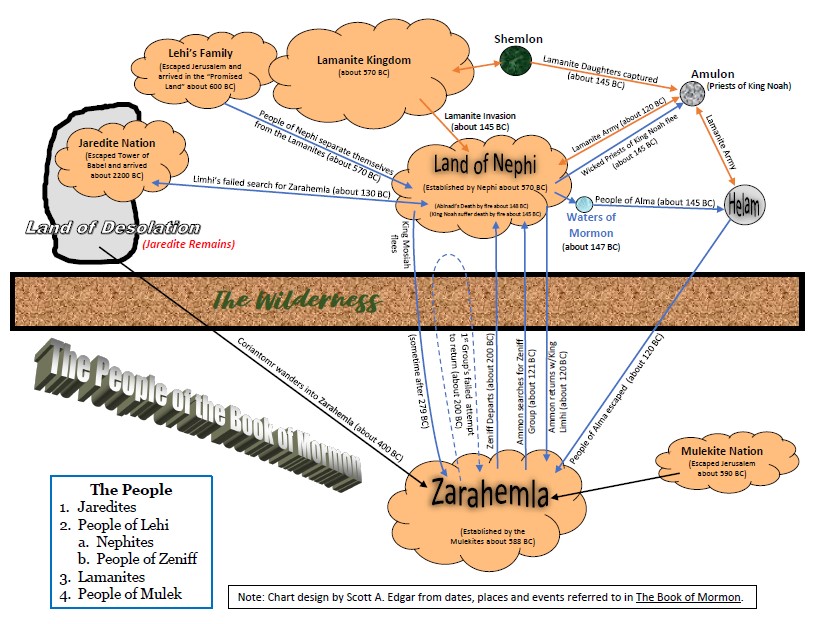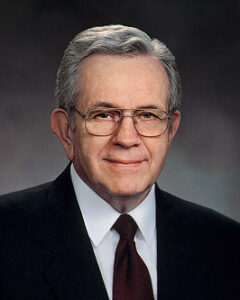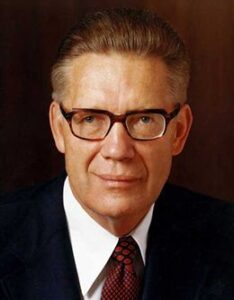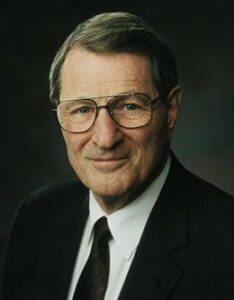Author: saedgar
A Powerful and Prophetic Testimony of the Book of Mormon
I testify that one cannot come to full faith in this latter–day work—and thereby find the fullest measure of peace and comfort in these, our times—until he or she embraces the divinity of the Book of Mormon and the Lord Jesus Christ, of whom it testifies. If anyone is foolish enough or misled enough to reject 531 pages of a heretofore unknown text teeming with literary and Semitic complexity without honestly attempting to account for the origin of those pages—especially without accounting for their powerful witness of Jesus Christ and the profound spiritual impact that witness has had on what is now tens of millions of readers—if that is the case, then such a person, elect or otherwise, has been deceived; and if he or she leaves this Church, it must be done by crawling over or under or around the Book of Mormon to make that exit. In that sense, the book is what Christ Himself was said to be: “a stone of stumbling, … a rock of offense,” a barrier in the path of one who wishes not to believe in this work. Witnesses, even witnesses who were for a time hostile to Joseph, testified to their death that they had seen an angel and had handled the plates. “They have been shown unto us by the power of God, and not of man,” they declared. “Wherefore we know of a surety that the work is true.”
Elder Jeffrey R. Holland
A Casual or Consecrated Member of the Church

Exposing the Radical Harris-Waltz Agenda
Romance Ice Skating w/Air Supply
Brother Ahmad S. Corbitt: How activism against the Church can blind, mislead ‘valiant’ souls
‘In my view, activism toward the Church is one of the most masterful deceptions of our time,’ Brother Corbitt says

While serving as a stake president, Brother Ahmad S. Corbitt was teaching about The Family: A Proclamation to the World in a sacrament service when one brother very publicly walked out in protest.
Although the member had failed to sustain his leaders, Brother Corbitt counseled with him about the impropriety of his method and help him understand prophetic principles. Church leaders also continued to help the brother financially support his family and regain employment.
“We recognized who he really was, overlooked his lapse in judgment and taught him,” Brother Corbitt said.
Brother Corbitt, who now serves as first counselor in the Young Men general presidency, related the experience to Church-endorsed chaplains in early October as an example of what he called activism or advocacy against The Church of Jesus Christ of Latter-day Saints. He titled his remarks, “Activism vs. Discipleship, Protecting the Valiant.”

“I would like to address an especially effective tactic Satan is using to blind and mislead the young, those transitioning from other religious traditions and cultures, and even longtime and lifetime members of the Lord’s restored Church,” Brother Corbitt said.
“In my humble view, it is one of the great mists of darkness of our time. I speak of our enemy’s effort to transform disciples of Jesus Christ into activists toward or against the Lord’s Church and its leaders.”
View the full text of the talk or watch the presentation here.
Activism vs. discipleship
Brother Corbitt defined activism as “the policy or action of using [campaigning or] vigorous campaigning to bring about political or social change especially in support of or opposition to one side of a controversial issue.”
Does this mean activism and advocacy are bad? Not at all, he said.
Brother Corbitt cited several examples from American history, from the Boston Tea Party to the signing of the Declaration of Independence, the Constitution’s Bill of Rights and the civil rights movement.
“The United States was founded on and through activism and advocacy by activists,” and “you and I are beneficiaries of this activism,” Brother Corbitt said.
“But activism or advocacy directed toward or against the Church is a secular, worldly device misapplied in a spiritual, otherworldly context,” he said. “Change in the kingdom of God is not accomplished in the same way as change is in, say, government.”
Brother Corbitt continued: “When activism or advocacy is directed at the kingdom of God on earth or its leaders, especially prophets and apostles, it is the wrong tool for the wrong job in the wrong place. Why? Because it effectively but subtly undermines the doctrine of Christ, which is God’s plan for changing, saving and exalting His children.”

Adversary’s three-step maneuver
Brother Corbitt described the adversary’s three-step strategy for this entrapment, which he said is “genius in its simplicity and effectiveness.”
- “Focus the rising generation and the valiant generally away from the doctrine of Christ and onto real or imagined unfairness or injustice in the Lord’s Church and the imperfections of its leaders.
- “Use this shift in focus to stir up feelings of disillusionment, annoyance, resentment, anger and hatred toward Church policies, declarations, proclamations, principles, doctrines and eventually leaders.
- “Manipulate these negative impulses to instigate the use of worldly or secular activism or advocacy rather than the doctrine of Christ to effect change in the kingdom of God.”
Three thoughts on activism toward the Church
Brother Corbitt offered three thoughts for recognizing and avoiding activism against the Church and its leaders.
First, be sensitive to the more vulnerable of this deception.
Latter-day Saints of all ages, experiences and backgrounds, including those coming from different faith traditions, may not yet understand the doctrine of Christ or its importance.
“They will likely only know and trust the telestial tools they have seen used in the world,” Brother Corbitt said. “We will have to help them see why the doctrine of Christ should have priority over all other causes, why it should always govern our methods and manners and why it is our only real hope to accomplish any righteous change or cause.”
Second, recognize that valiant spirits can sometimes be misguided and need patient guidance.
In the Book of Mormon, Alma the Younger and the sons of Mosiah allowed Satan to misdirect their actions before they were converted and engaged in gathering Israel.
“Among the many important lessons I take from the Book of Mormon is the principle that we cannot always judge others’ premortal righteousness by their current state of confusion or even rebellion,” Brother Corbitt said. “This story of redemption of the errant valiant makes the Prophet’s call to today’s rising generation to help gather Israel more timely and urgent. The same is true of His teaching them of their true identities.”

Third, the enemy uses activism towards the Church to cleverly and effectively undermine the doctrine of Christ, especially faith in Him.
Activism toward the Church, which Brother Corbitt abbreviated as “ATC,” weakens faith and trust in God. Its pattern is to undermine faith in Church leaders, Brother Corbitt said.
“This distrust is the very opposite of the faith the Lord requires of His covenant people in Himself, His prophets and apostles, and those they direct,” he said.
ATC tends to focus on leaders’ imperfections and opposes their testimonies by undermining their credibility in the eyes of followers.
“Masquerading as a higher and nobler cause, ATC instigates distrust of these leaders,” he said. “By seemingly customizing this deceptive approach to the valiant, he (the adversary) cleverly diminishes their real power (faith) and robs them of their true mission (the gathering). He effectively turns the gatherers into scatterers.”
Brother Corbitt said ATC focuses on leaders’ human weakness rather than their strengths and mantles. “In doing so, it subtly gives permission and justification for murmuring, backbiting and evil speaking of the Lord’s anointed, all deceptively cloaked as principled,” he said.
ATC can also deceive new converts who may be more used to religious traditions where leaders are hired or fired by their local congregations. Some will be more accustomed to religious leaders who avoid controversial topics.
Brother Corbitt also counseled to beware of catchphrases that somehow preserve a sense of religious sincerity to influence others, such as “I don’t follow the Brethren, I follow Jesus Christ,” or “I am holding the Brethren accountable to do what’s right.”
“These dangerous claims are as counter to Jesus’ own teachings as they are confused,” Brother Corbitt said. “By contrast, discipleship of Jesus Christ builds and expresses ‘confidence, faith and prayer’ on behalf of Church leaders.”
“Please do not misunderstand. I am not at all saying ATC’s causes are not important or good or often pursued in good faith,” he said. “A light bulb must be changed to avoid darkness and restore light. My simple point is a hammer is not the right tool for that job. All needed and appropriate changes in the kingdom of God are God’s work to bring to pass.”
How to recognize ‘ATC’
Brother Corbitt taught that ATC “effectively gaslights” Church members who engage in it, “not in the sense that it manipulates them to question their own sanity, but in that it narrows minds, enlarges beams and blind spots, and invites judgmentalism all at once.”
“Whereas discipleship says, ‘Lord is it I?’ or ‘Help thou mine unbelief,’ ATC rarely seeks to humbly understand others’ perspectives or experience or to meekly introspect,” Brother Corbitt said.

Here are some other ways to recognize activism toward the Church:
- “ATC looks backward with an eye of judgment and condemns or looks sideways with an eye of scorn and finds fault.”
- “ATC sits on the trash heap of disappointing history recycling others’ real or imagined sins and shortcomings.”
- “It also finds fault with current attempts to regulate the affairs of the Church, chaining everyone involved to the past or present.”
- “ATC generally ignores Church leaders’ positive features and accomplishments.”
- “By nature, ATC will always drive its followers to find other issues.”
- “ATC … cleverly plays on cultural identities and seeks to elevate them above all else in the minds and hearts of its followers. It substitutes culturally familiar voices for divine ones. … You and I must help those to whom we minister avoid allowing their social identities to consume them.”
- “ATC dismisses prophetic priorities.”
- “ATC is like thrashing in quicksand. … Its methods sink the souls and the faith of its followers because, again, this approach undermines the doctrine of Christ.”
- ATC not only fosters contention but justifies it as noble.
Questions to consider
Brother Corbitt encouraged those in the audience to help those they serve to see that “ATC is the world’s approach, not the light of the world or a city on a hill.”
“In my view, ATC is one of the most masterful deceptions of our time,” he said. “ATC is eerily similar to the premortal rebellion against God’s plan.”
Brother Corbitt encouraged members to counsel with their local leaders, “humbly and lovingly expressing concerns, sharing observations, even lodging formal complaints.”
He offered the following questions to help “valiant friends” know whether to pursue a cause:
- Does it promote the doctrine of Christ in our lives?
- Does it build faith in Christ, His Atonement, His gospel and His promises?
- Does it lead others to trust God and be confident in the teachings and leadership of His servants?
- Is it faultfinding or critical of Church leaders?
- Does it generate feelings of love for all others or some form of anger?
- Does it foster harmony in Christ among all God’s children or does it tend to divide?
- Does it seem more geared to advancing a narrative rather than the cause of Christ?
- In some cases, there is need to warn and urge change; does it do so consistent with gospel principles and methods or does it tend to rely on worldly wisdom or secular sayings and approaches?
- Is it contentious or does it introduce peace, unity and healing?
- Does it advance prophetic priorities?
“May we all be effective and divinely guided in helping the rising generation and all our members use the higher, holier methods — especially faith in Christ — that the Lord, Himself, prescribed for changing hearts, minds and behavior, and to build a unified people,” Brother Corbitt said.
Their Baby!
_________________________________________
Now watch the following tender and loving moments.
Horses have been in our lives forever. They are a loving gift from our Heavenly Father!
The Great Plan of Salvation
The Great Plan of Salvation (for Heavenly Father’s Children!)
We often face false philosophies of the world regarding the true purpose of our earthly existence. In the Church of Jesus Christ, we learn of God’s Great and Eternal Plan of Salvation and strive to understand the purpose of mortality and the role of our Heavenly Father’s plan to give direction and meaning to life. As we grow in our understanding of the plan of salvation, we will understand more clearly how tribulations, joy, work, study, and maintaining physical strength play an important part in our daily experiences. When we follow the Savior’s example, we are happier and are better able to bless the lives of our families and those we serve.
Heavenly Principles we should learn and understand:
-
- Heavenly Father prepared a plan of salvation that teaches us where we came from, why we are here, and where we are going after mortality.
- Understanding our place in the plan of salvation helps us develop faith and find joy in a world with many inequities.
- We can use our knowledge of the plan of salvation to help us in our earthly challenges.
Heavenly Father plan of salvation teaches us where we came from, why we are here, and where we are going after mortality.
Scriptural References:
-
- Moses 1:39 (“this is my work and my glory”)
- 2 Nephi 9:6 (“the merciful plan of the great Creator”)
- 2 Nephi 9:13 (“the plan of our God”)
- Alma 24:14 (“the plan of salvation”)
- Alma 34:16 (“the great and eternal plan of redemption”)
- Alma 42:16 (“the plan of happiness”)
Three stages of existence: premortal life, mortal life, and postmortal life.
Premortal Life:
-
- Heavenly Father is a celestial being with a glorified body of flesh and bones (see D&C 130:22). He is the Father of our spirits (see Romans 8:16–17; Hebrews 12:9). We lived with Him as spirit children (see Abraham 3:22–23). In “The Family: A Proclamation to the World,” the First Presidency and the Quorum of the Twelve Apostles stated:
“All human beings—male and female—are created in the image of God. Each is a beloved spirit son or daughter of heavenly parents, and, as such, each has a divine nature and destiny. …
“In the premortal realm, spirit sons and daughters knew and worshiped God as their Eternal Father and accepted His plan by which His children could obtain a physical body and gain earthly experience to progress toward perfection and ultimately realize his or her divine destiny as an heir of eternal life” (“The Family: A Proclamation to the World,” Ensign or Liahona, Nov. 2010, 129).
-
- Heavenly Father taught us His plan of salvation (see D&C 138:56). His plan allowed us to come to earth to gain a body and learn obedience (see Abraham 3:24–26).
- The plan required a Savior and Redeemer; Jesus Christ was foreordained to be our Savior and Redeemer by Heavenly Father (see Moses 4:2; Abraham 3:27).
- We rejoiced as we began to understand Heavenly Father’s plan. (See Job 38:4–7. Latter-day prophets have taught that verse 7 refers to the joy we felt in our premortal existence when we accepted the plan of salvation. For example, see the statement by Elder Richard G. Scott of the Quorum of the Twelve Apostles:
“Although our memory of it is withheld, before we came to this earth we lived in the presence of God, our Eternal Father, and His Son, Jesus Christ. We shouted for joy when given the privilege of coming to this earth to receive a body and to move forward in God’s plan for our happiness. We knew that we would be tested here. Our determination was to live obediently to be able to return to be with our Father forever. Part of that testing here is to have so many seemingly interesting things to do that we can forget the main purposes for being here. Satan works very hard so that the essential things won’t happen.” (“Jesus Christ, Our Redeemer,” Ensign, May 1997, 53–54).
-
- Satan rebelled against Heavenly Father’s plan and offered an alternative plan that would limit our agency. He and his followers were cast out. (See Revelation 12:7–11; D&C 29:36; 76:25–27; Moses 4:1, 3–4.)
Mortal Life:
-
-
- Being faithful in our premortal life was keeping our “first estate”; our “second estate” began with our mortal life (see Abraham 3:26).
- Because of the Fall of Adam and Eve, we entered mortality in a fallen state. The Fall and our mortal condition are necessary parts of the plan. (See 2 Nephi 2:22–25; D&C 29:40; Moses 5:10–11.)
- Jesus Christ redeemed us from the Fall. Without His Atonement we could not be resurrected and would live as spirits in misery with Satan forever. (See 2 Nephi 2:26; 9:6–10.)
- Our experiences during mortality allow us to use our agency to make choices and experience their consequences (see 2 Nephi 2:11–13, 27; Alma 34:32–34; D&C 58:27–28).
- Establishing and teaching eternal families is a focus of the plan of salvation (see D&C 93:40; 131:1–4; 138:47–48; Moses 2:28).
- Whatever knowledge and intelligence we gain during mortality through our diligence and obedience will rise with us in the Resurrection (see D&C 130:18–19).
-
Postmortal Life:
-
-
- At death, our spirits go to the spirit world to await the Resurrection. There we continue to learn. (See Alma 40:11–14; D&C 138:10–22.)
- The Lord will judge us according to how we lived our lives and according to the desires of our hearts (see John 5:22, 30; Alma 41:3; D&C 137:9).
- Those who follow Heavenly Father’s plan will return to live like Him in His presence (see D&C 76:92–96; 93:16–20).
-
 A Grand Three-Act Play
A Grand Three-Act Play
Consider the following comments from President Boyd K. Packer (1924–2015) of the Quorum of the Twelve Apostles given when he likened the plan of salvation to “a grand three-act play”:
-
-
- Act 1, is entitled ‘Premortal Life.’ The scriptures describe it as our first estate (see Jude 1:6; Abraham 3:26, 28).
- Act 2, from birth to the time of resurrection, is the ‘Second Estate.’ And…
- Act 3, is called ‘Life After Death’ or ‘Eternal Life.’
-
“In mortality, we are like actors who enter a theater just as the curtain goes up on the second act. We have missed act 1. The production has many plots and subplots that interweave, making it difficult to figure out who relates to whom and what relates to what, who are the heroes and who are the villains. It is further complicated because we are not just spectators; we are members of the cast, on stage, in the middle of it all!
“As part of the eternal plan, the memory of our premortal life, act 1, is covered with a veil. Since we enter mortality at the beginning of act 2 with no recollection of act 1, it is little wonder that it is difficult to understand what is going on.” (President Boyd K. Packer, “The Play and the Plan” [Church Educational System fireside for young adults, May 7, 1995], 2).
“We sometimes wonder: If the plan really is the great plan of happiness, why must we struggle to find fulness of it in mortal life?
“If you expect to find only ease and peace and bliss during act 2, you surely will be frustrated. You will understand little of what is going on and why things are permitted to be as they are.
“Remember this! The line ‘And they all lived happily ever after’ is never written into the second act. That line belongs in the third act, when the mysteries are solved, and everything is put right. …
“Until you have a broad perspective of the eternal nature of this great drama, you won’t make much sense out of the inequities in life. Some are born with so little and others with so much. Some are born in poverty, with handicaps, with pain, with suffering. Some experience premature death, even innocent children. There are the brutal, unforgiving forces of nature and the brutality of man to man. …
“Do not suppose that God willingly causes that which, for his own purposes, he permits. When you know the plan and purpose of it all, even these things will manifest a loving Father in Heaven. Until you have a broad perspective of the eternal nature of this great drama, you won’t make much sense out of the inequities in life.” (President Boyd K. Packer, “The Play and the Plan,” 2).
We can use our knowledge of the plan of salvation to help us in our earthly challenges:
We developed talents and abilities in the premortal life and that knowledge of our premortal life should encourage continued faithfulness and development of our talents and abilities during mortality.
Seriously consider the following questions.
-
- How does knowing that you were willing in your premortal life to submit to certain conditions on earth affect how you accept and deal with challenges? And,
- How can the knowledge that we developed various talents and abilities in our premortal life help motivate us to develop them in this life also?
- What are your sincere thoughts?
And finally, please read and consider the following statements by former General Authorities of the Church of Jesus Christ of Latter-day Saints.
We developed talents and abilities in the premortal life:
 “In this prior life, this premortal existence, this preexistence, we developed various capacities and talents. Some developed them in one field and some in another. The most important of all fields was the field of spirituality—the ability, the talent, the capacity to recognize truth” (Bruce R. McConkie, “Making Your Calling and Election Sure” [Brigham Young University devotional, Mar. 25, 1969], speeches.byu.edu).
“In this prior life, this premortal existence, this preexistence, we developed various capacities and talents. Some developed them in one field and some in another. The most important of all fields was the field of spirituality—the ability, the talent, the capacity to recognize truth” (Bruce R. McConkie, “Making Your Calling and Election Sure” [Brigham Young University devotional, Mar. 25, 1969], speeches.byu.edu).
Consider these Final Questions and Thoughts!
-
- Why do you think spirituality is “the most important of all fields?”
- In what ways might spirituality affect our ability to understand temporal knowledge?
Knowledge and understanding of our premortal life should encourage continued faithfulness and development of our talents and abilities during mortality. Several common temporal challenges experienced in mortality include for example: finding a job, having sufficient finances to meet basic needs, keeping good health, and understanding trials. A firm foundation of “Spirituality” will build our strength to endure mortality.

“Agreeing to enter this second estate, therefore, was like agreeing in advance to anesthetic—the anesthetic of forgetfulness. Doctors do not de-anesthetize a patient, in the midst of what was previously authorized, to ask him, again, if it should be continued. We agreed to come here and to undergo certain experiences under certain conditions.” (Elder Neal A. Maxwell, “Pre-mortality, a Glorious Reality,” Ensign, Nov. 1985, 17).
Click HERE to return to my Index of Pages page.
